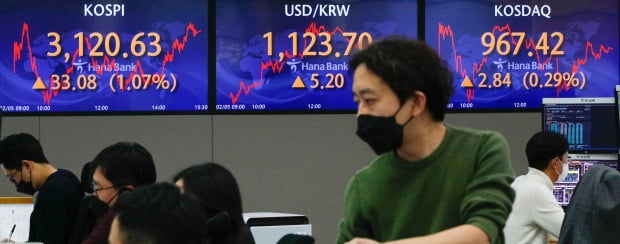
Last week, the KOSPI index closed at 3120.63, up 144.42 points (4.85%) from the previous week. /News 1
The domestic stock market continues to trend sideways in the box zone. Last week, the KOSPI index recovered to the 3100 mark due to the buying trend of individuals and foreigners. The domestic stock market, ahead of the Lunar New Year holidays, is expected to fluctuate as expectations for economic improvement amid additional US stimulus measures this week and the desire to realize profits overlap. As volatility is expected, some advise to invest in sectors that are expected to improve earnings.
According to the Korea Exchange on the 7th, last week, KOSPI ended trading at 3120.63, up 144.42 points (4.85%) from the previous week. The KOSDAQ index rose 38.69 points (4.16%) to 967.42 over the same period.
Individuals and foreigners net bought 1.262.5 billion won and 4889 billion won respectively in the domestic stock market (KOSPI + KOSDAQ) last week. On the other hand, the agency realized profits by selling 1.618.9 billion won.
The U.S. stock market was strong, with good employment indicators added to the Senate passage of additional stimulus packages. The Dow index rose 3.9% last week. The Standard & Poor’s (S&P) 500 and the technology stock-centered NASDAQ index also jumped 4.7% and 6%, respectively. The S&P500 index and the Nasdaq reached record highs side by side.
This week (8-10th), the KOSPI index is expected to move around the 3150 line. Excluding Pfizer and Modena, the new coronavirus infection (Corona 19) vaccines have shown good clinical results, raising expectations for economic recovery following the spread of the vaccine. Corona 19 vaccination will begin in Korea this month as well.
The US stimulus package is supporting the bottom of the stock market. A $1.9 trillion worth of stimulus package passed through the Senate could serve as a driving force for the stock market.
Kim Young-hwan, a researcher at NH Investment & Securities, said, “The US House of Representatives has decided to process a $1.9 trillion stimulus bill and the Senate has also passed it.”
China’s liquidity recovery movement is a bad news for domestic stock markets. The central bank of China has decided that the economy is recovering since the end of last month and is trying to recover liquidity. If China recovers liquidity and the interest rates between banks in Shanghai (SHIBOR) rise, Asian stock markets could fall at once.
Dae-hoon Han, a researcher at SK Securities, said, “The measures to recover liquidity in China are considered temporary, but it is necessary to continue to confirm that the upward trend may change.” I said.
As the volatility increases, it is advised to invest in sectors that are expected to improve performance. It is expected that large-cap stocks related to semiconductors and automobiles, which have led the domestic stock market, will continue to rise.
Yoon Jin-woo, reporter at Hankyung.com [email protected]
Ⓒ Hankyung.com prohibits unauthorized reproduction and redistribution
